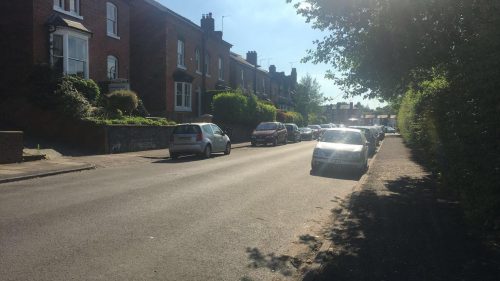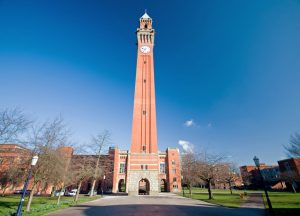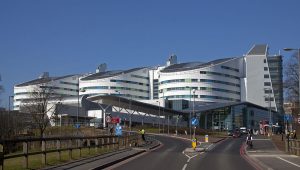Labour in fight to retain seat vacated by Vote Leave campaigner

The outgoing MP for Edgbaston, Gisela Stuart, will be best remembered in popular memory for the events which book-ended her Parliamentary career.
In May 1997, she was the first televised Labour gain of what became Tony Blair’s landslide. In winning Birmingham Edgbaston, she ended the Conservative Party’s 99-year hold on the seat.
Two decades later the German-born politician chaired the Vote Leave campaign in the EU referendum, one of the most high-profile Labour MPs to be publicly anti-EU.
The constituency, which is a popular area for professionals, families and students thanks to its close proximity to the city centre, is 32nd on the Conservative’s list of target seats and with Stuart’s Labour reign over, it is up for grabs.
Labour is defending a majority of just 2,706 from the Conservatives, in a seat where UKIP came third in 2015 with more than 4,000 votes.
Henrietta Brealey, director of policy and strategic relationships at Greater Birmingham Chambers of Commerce, which is based in Edgbaston, believes Brexit is the number one issue for businesses in this election.
She said: “The most important issue concerning businesses is gaining the best possible deal out of Brexit.
“Businesses of all shapes and sizes will be impacted by Brexit, whether it be through access to the customs union and single market or access to funding, talent and labour from Europe. Gaining the best possible deal for business is vital.”
Other concerns for businesses in the constituency, and across the region, include taxation and infrastructure.
“Businesses have been hit by a raft of upfront costs in recent years from auto-enrolment to the apprenticeship levy and the introduction of the National Living Wage,” said Brealey.
“While many of the policies associated with these costs have a societal benefit, for businesses themselves they mean costs have increased significantly over a short space of time.
“Major infrastructure projects, such as HS2 in our region, can provide a welcome boost to local economies through associated contract and supply chain opportunities as well as long term improving the ease of doing business through better connections across the country.”

The University of Birmingham Clocktower. Credit: © Copyright NickGeo on Geograph.
One of the city’s biggest employers, University of Birmingham, is also based in Edgbaston. It wants parties to maintain and grow funding for science research and innovation, and create an effective immigration system that will enable the university to retain the best international talent post-Brexit.
City REDI, a research institute which is based at the University of Birmingham, aims to contribute to local decision making and strategy development.
Rebecca Riley, administrative director at City REDI, believes that restoring confidence among the local business community is a must for the future MP.
She said: “Individual businesses are ultimately affected by spending decisions, and currently investment and spending is low due to market instability and lack of confidence. Whoever wins the election restoring investment confidence should be a priority.
“For the West Midlands, given the significant exporting levels there is potential for an adverse effect if agreements on tariffs and free movement of goods are not resolved, although some resilience exists in the region’s high exports to countries outside the EU.
“Although wide ranging, people’s decisions appear to have swung back to the normal core of health, social care, policing, safety and education. Although Brexit is an issue, the real issues of day to day life are of far greater importance to the individual voter.”
Edgbaston, which includes Bartley Green, Harborne and Quinton, has been represented by a female MP since 1953. Before Stuart, Conservatives Edith Pitt and Jill Knight held the seat for 13 and 31 years respectively.
Its most famous incumbent was Prime Minister Neville Chamberlain, who was MP from 1929-1940, and his father Joseph’s great-great-granddaughter, Caroline Squire, is hoping to return the seat to Conservative control.
She is up against Labour’s Preet Gill, who would become the first female Sikh MP if she wins on June 8.

Preet Gill
Gill is a children’s services manager in Erdington and grew up in Edgbaston. She said: “As I have lived and worked in Edgbaston, I understand the diversity of the area.
“My background in the council means that I know how to negotiate, who we need to be talking to and how to influence the decision making. I want to fight these cuts that the government are making which are impacting the local community, but we have to be innovative and independent thinking.”
Gill believes that Edgbaston faces four major issues. She said: “The NHS is a huge problem within Edgbaston and hospitals are under immense pressure right now, staff feel overworked and undervalued and we are not doing enough.
“Primary and secondary schools in the area have been left devastated by cuts, we should be investing in our future generation and now taking away from them. Another issue is policing and the fact that there simply isn’t enough of them on the streets.
“Brexit is a huge issue in the area. Access to the single market is going to be absolutely crucial for these businesses and we also need to make sure that young people have the right skills sets in terms of getting a job here.”

Queen Elizabeth Hospital, Birmingham. Credit: Tony Hisgett on Wikimedia
Liberal Democrat candidate Colin Green, who spends his days as a software engineer at Connect2, believes that Brexit and what Edgbaston can get out of it is the most important aspect of the election.
He decided to stand as a candidate after being left shocked with Gisela Stuart’s EU stance. He said: “I lived in the constituency until late last year and we were so upset with what Gisela Stuart did that we had to stand up against her.
“As it happens, she has run away, but the people locally are furious with her. Companies in Edgbaston are mainly exporters, sectors which are going to be affected by Brexit and it puts many local jobs at risk.
“University of Birmingham is suffering as they are struggling to get research funding and the Queen Elizabeth Hospital, the biggest employer in the region, is also going to see job losses. We need a trade deal that we stay inside the single market to be able to keep our economy running.”
Having been represented by just seven MPs in 132 years, and with a sitting MP never having been beaten in an election, Edgbaston’s voters have historically been loyal. Next week will tell us who they have chosen to attach their loyalties to this time.
Caroline Squire was contacted to be interviewed for this article.









